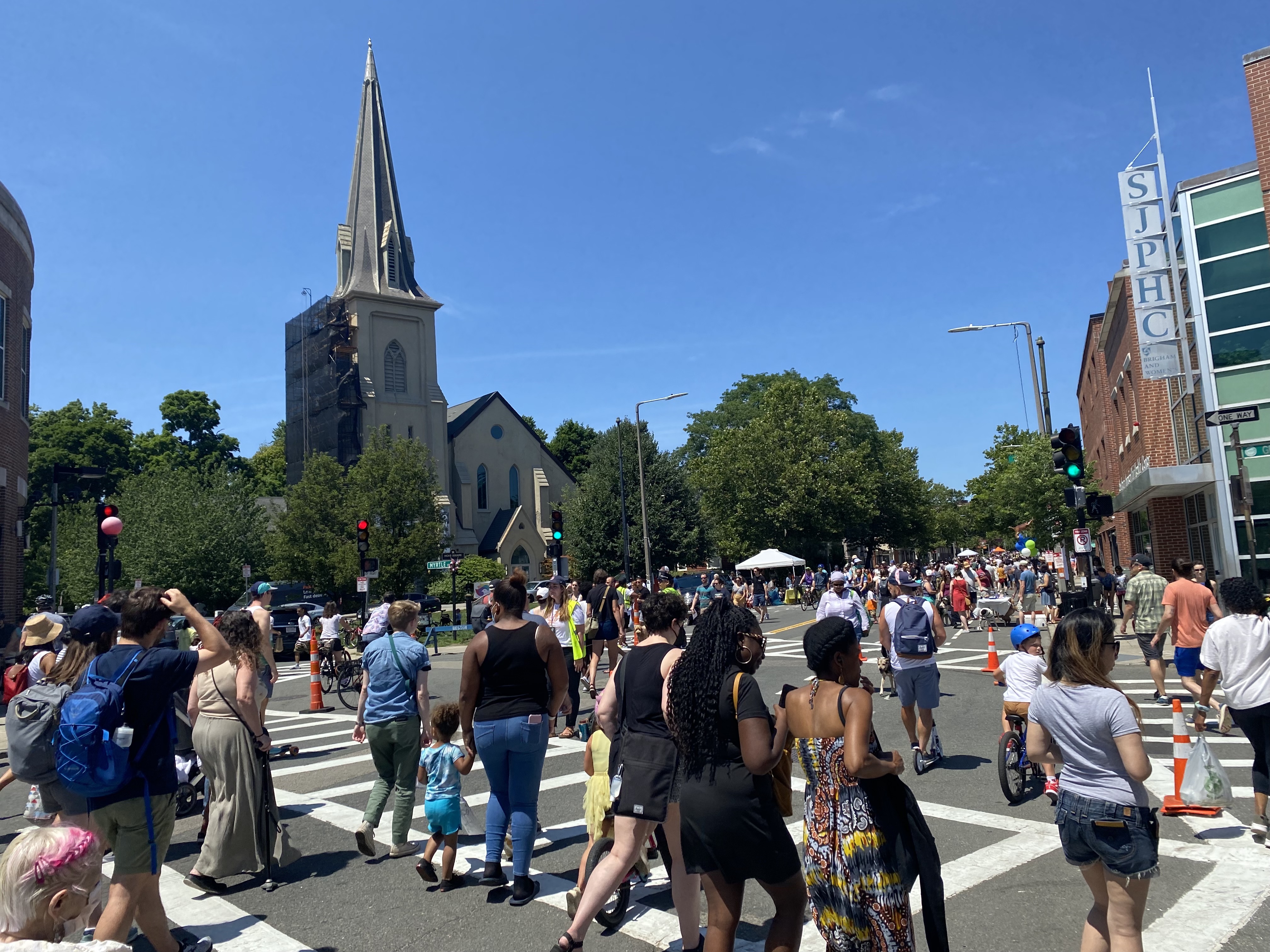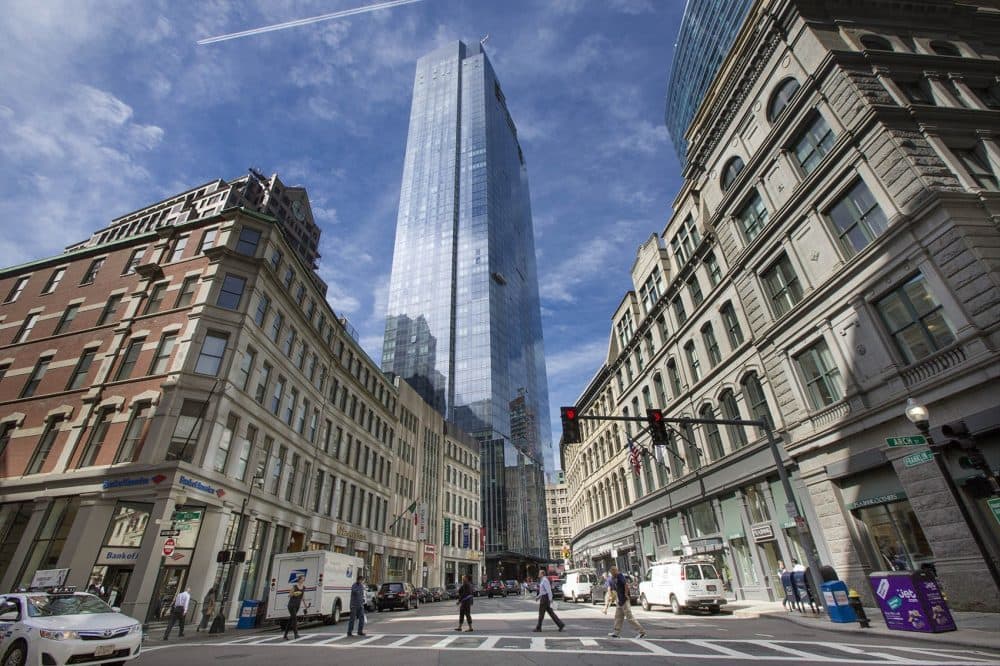Mayor Wu plans to file legislation that would allow Boston to increase property taxes on businesses. The move comes as commercial property values have dipped due to inflation and the post-pandemic shift to remote and hybrid work. A recent report found the city may lose $1.4 billion in tax...

www.wbur.org
Boston Mayor Michelle Wu plans to file legislation that would allow the city to increase property tax rates on businesses beyond the limit set by the state, city officials told reporters Thursday.
The move comes as commercial property values have dipped in the city due to the post-pandemic shift to remote and hybrid work, and economic impacts like inflation. A
recent report by the Boston Policy Institute found the city may lose $1.4 billion in tax revenue over the next five years due to empty office spaces. Boston could also face a recurring shortfall of about $500 million each year after that first half-decade, the report found.
WBUR is a nonprofit news organization. Our coverage relies on your financial support. If you value articles like the one you're reading right now,
give today.
Without a change to state law, the property tax burden could shift toward residential properties, Wu said Thursday.
"What we are trying to avoid here is a more sudden, dramatic and concentrated shock to residential property owners, which would hurt residents and businesses alike," Wu said.
Wu said she will file a home rule petition at the city council next week with a goal of getting the measure up to the Legislature as quickly as possible. The measure would give the city the flexibility to temporarily shift more of the property tax levy onto commercial and industrial property owners. If approved, new tax rates would only go into effect if commercial valuations come in low as expected, Wu said.
The measure would give the city a three-year window to exercise the tax change since the city won't have valuation numbers until later in the year, Wu added.
The Boston Policy Institute analysis contended that when commercial property values drop, tax revenue drops — and that would diminish the dollars the city can put toward vital services. But city officials disputed that part of the analysis.
"The decline in [property] values results in an increase in tax rate, and not a decline in the revenue collected through property taxes," the city's chief financial officer Ashley Groffenberger said.
Wu also added, "services are going to be fully funded."
Tom O'Brien, the CEO of The HYM Investment Group, attended Thursday's briefing and called Wu's proposal a "really important tool" to lessen the tax burden on residents, "which will help us quite a bit in the city with a housing crisis that is ongoing." O'Brien also said he'd like to see the proposal paired with "potential new growth or new projects."
Trevor Samios, a vice president at WinnCompanies, which builds affordable housing in Boston, called Wu's measure "thoughtful" and said it "will keep the city of Boston on firm financial footing in the short term, allowing the city to sustainably stabilize and grow the services that are so important to the quality of life for folks who live and work here."
But some say shifting more property tax burden to commercial properties is no solution at all.
ADVERTISEMENT
"We are deeply concerned that increasing commercial tax rates to recoup lost revenue will only take us closer to the urban doom loop being seen in many other American cities," Greg Vasil, CEO of the Greater Boston Real Estate Board, said in a statement. "Businesses have carried a tremendous fiscal burden for the city, and pushing them harder at a time when their buildings have lost value is fiscally irresponsible."
The Boston Policy Institute report also raised concerns that imposing higher taxes on commercial properties would create more challenges for those businesses.
Nick Ariniello, the commissioner of Boston's assessing department, said the city's proposal wouldn't create "a shock" to the money that commercial property owners have already forecasted for their taxes.
"We do not in any way anticipate that this is going to be something that is going to cause commercial harm," Ariniello said.
Declining commercial property values are a challenge for cities across the country. But, the Boston Policy Institute report noted, Boston depends more on commercial real estate tax revenue than many other places. Cities in other states can levy local sales and income taxes, so they are less reliant on property taxes. State law bars this practice in the commonwealth.
At a WBUR town hall last week, Wu
hinted she would likely seek help from lawmakers to cushion the impact of a potential commercial real estate tax shortfall. The city faced a similar situation in 2003, Wu noted, but received legislative relief to avoid a massive tax hike on homeowners.
But even with an assist from the Legislature, Wu noted at the town hall, there remains the long-term challenge of figuring out how to avoid continuing declines in commercial property values. Wu reiterated that point Thursday and said revitalizing downtown and reimagining how office buildings are used is key.
"We know that ultimately to get foot traffic backup in our downtowns, there are some major shifts that will need to happen around public transportation and it's reliability, around housing and shifting to a more residential mix of units there," Wu told reporters.
Boston has been
helping businesses fill vacant storefronts as part of a broader strategy to transform downtown and attract more visitors. Foot traffic has grown steadily downtown, but it not yet back to pre-pandemic levels. The number of vacant storefront has declined by nearly 17% compared to this time last year, Wu said.
The city is also offering
tax breaks for developers in an effort to
convert empty offices into apartments. Wu said there are already 200 housing units in the pipeline of its residential conversion program.




